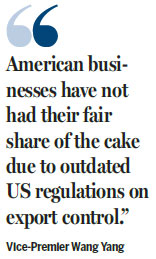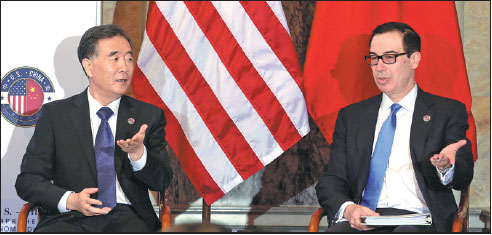Vice-Premier Wang Yang urged the United States on Tuesday to loosen its "outdated" restrictions on high-tech exports to China so it can tap the vast Chinese market and reduce the bilateral trade imbalance.
Wang, who is in Washington for the first round of China-US Comprehensive Economic Dialogue, said that as China upgrades its industries, there is a huge market for US exports of advanced technologies, key equipment and critical parts to China.
"Unfortunately, American businesses have not had their fair share of the cake due to outdated US regulations on export control," he told a luncheon attended by US Treasury Secretary Steven Mnuchin, Commerce Secretary Wilbur Ross and hundreds of Chinese and US business leaders.

Wang cited China's import of integrated circuits, which hit $227 billion last year, more than the import of crude oil, iron ore and primary plastics combined. But only 4 percent of China's integrated circuit imports came from the US.
If the US were to liberalize its export barriers against China to the same level applicable to France, the US trade deficit with China would drop by up to 34 percent, Wang said, citing a Carnegie Endowment for International Peace article.
The demand for high-quality US products and services is growing fast, according to Wang. The US-China Business Council predicted that US goods and services exported to China will double to $369 billion in the coming decade and rise to $520 billion by 2050.
"China's development and progress is a long-term certainty, which offers the most important external environment for foreign businesses to work with China," Wang said.
"I am sure any business with vision would value such a huge market, and any government with ambition would value cooperation with China."
He also stressed that cooperation is the only right choice for the two countries, a message expressed by several senior Chinese leaders. "The giant ship of China-US economic and trade relations is sailing on the right course," Wang said.
Foreign Ministry spokesman Lu Kang told a regular news conference on Wednesday in Beijing that Wang's speech has sent three key messages: cooperation is the only right choice for China and the US; China's development has long-term certainties; and the Chinese market has huge potential.
Noting that it is natural for the two countries to have economic disagreements and friction, Lu said the two sides could properly handle disputes through dialogue with the principle of equal treatment and mutual trust.
Ross, the commerce secretary, described the China-US trade and investment relationship as "the most important in the entire world", saying "that relationship has brought benefits to both nations".
He applauded China's resumption of US beef imports after 14 years and described it as just a start, given the huge Chinese market potential.
"Even now, (although) we occasionally disagree on individual items, we have fundamentally shared objectives. So I am very hopeful about the opportunities through further success," Ross said.
Serious concerns about a trade war between the two large countries based on Trump's tough campaign rhetoric have dissipated dramatically the past few months, especially after the first summit between President Xi Jinping and Trump at the Mar-a-Lago resort in Palm Beach, Florida, in early April.
At Mar-a-Lago, the two sides established a four-track comprehensive dialogue mechanism and agreed to work on a 100-day action plan, which was due on July 16. Both sides have so far spoken positively of the progress made within a relatively short period of time.
 Vice-Premier Wang Yang and US Treasury Secretary Steve Mnuchin talk before the China-US Comprehensive Economic Dialogue, where they discussed economic and trade issues in Washington.Yuri Gripas / Reuters |